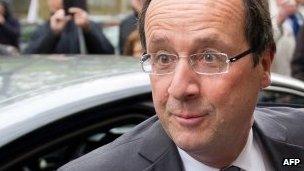President Hollande and the IMF
- Published
- comments

Some would welcome Mr Hollande speaking up for a greater emphasis on growth
Are international policy makers quaking at the possibility that Francois Hollande might soon be President of France?
Spending a few days in Washington and New York last week I was surprised to discover the answer was no.
I didn't meet anyone actively looking forward to a Hollande victory. That would be too much to expect.
Given the choice, diplomats and international officials almost always prefer to have the devil they know in charge of a major country, not to have to get to grips with someone new. And the little they do know of Mr Hollande - like that promise to slap a 75% tax rate on the country's top earners - has not left them very impressed.
However, few expect him actually to go ahead with that tax threat.
What they do expect Mr Hollande to do is to speak up for a more gradual approach to cutting eurozone budget deficits - and a greater emphasis on economic growth.
That is a debate that many senior members of the IMF would greatly welcome. So would many inside the White House.
I have written previously about the IMF's private efforts to persuade Germany and other eurozone countries not to take such a hard line of fiscal austerity in countries like Spain and Italy. These efforts have come more into the open, lately, in the heated debate over Spain's deficit plans, and the publication of the latest IMF Fiscal Monitor.
Privately, and publicly, the Fund supported Spain's recent decision to raise its deficit targets. The Fiscal Monitor even suggests the revised policy should have been looser still.
That same report also concludes that for countries with spare capacity in their economy (which in the current context means most countries in Europe), "fiscal adjustment implemented gradually has a smaller negative impact on growth than an upfront consolidation of the same overall size. This suggests that where feasible, more gradual fiscal consolidation is likely to prove preferable to an approach that aims at 'getting it over with quickly'. "
George Osborne's friend, Christine Lagarde, has never been willing to apply this logic to the UK's budget plans. We have to assume she will be equally tight-lipped in public when it comes to her own country, France.
And yet, if you had read everything that the IMF had produced recently on the subject of deficits and growth, you might well conclude that the Fund is rooting for the socialist - at least when it comes to short-term policies.
Hollande would balance the budget more slower than Sarkozy (by 2017 instead if 2016), and would focus more on tax rises to do it.
That doesn't sound like something the IMF would favour. But applying its own analysis of the so-called "fiscal multipliers" in different countries (the impact on growth of a given change in public spending or taxes) suggests that the socialist's approach would boost French GDP by about 0.2%, relative to President Sarkozy's plan, and cut France's public debt ratio slightly faster.
The difference between them is not large, and there's a big margin for error. Indeed, the IMF says the multiplier in France is particularly hard to measure because of big gaps in the data.
But in publishing all this new data, the Fund is clearly attempting to force a debate in Europe over the pace of fiscal tightening and its likely impact on growth.
Many fund officials would be happy to hear a French President re-ignite that debate after 6 May - though naturally, they would rather the president in question were not (gasp) a socialist.